The 8 Healthiest Nuts You Can Eat, According to Science
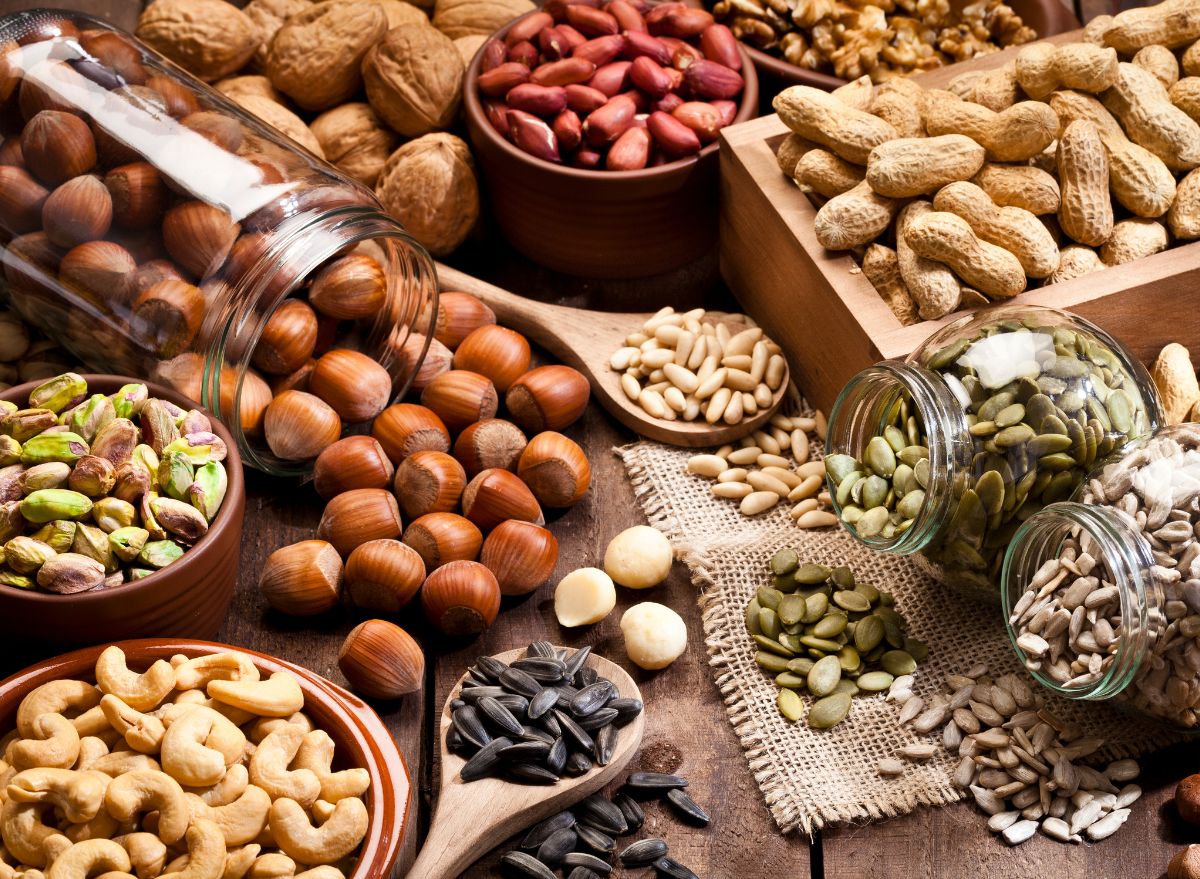
When the snack cravings strike, finding something that is both delicious and filling at the same time can be tricky. That is exactly why nuts are one of the best snack options around, offering everything from great taste to versatility (snack on them whole or blended into a butter!) to promoting satiety. As great sources of fiber, protein, and healthy fats, nuts are full of health benefits. Specifically, nuts have been linked to better heart health, brain health, and reduced inflammation.
While all nuts can help improve your overall health, we wanted to explore the healthiest nuts out of the bunch.
To learn more about nuts and their individual health benefits, we delved into the research and talked with an expert dietitian about the eight healthiest nuts you can incorporate into your diet. Read on, and for more healthy eating tips, check out the 10 Healthiest High-Fiber Foods You Can Eat.
Pistachios
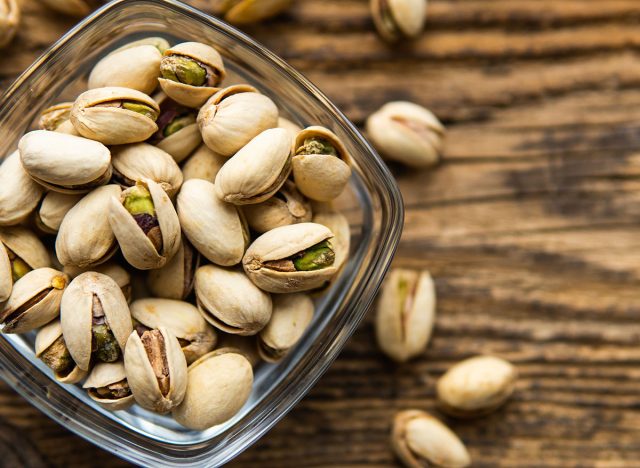
Pistachios are more than just a tasty snack to munch on between meals or put in your favorite desserts. This little green nut contains a variety of health benefits and is the only nut to be considered a “complete protein.”
“Pistachios are a plant-based source of complete protein, meaning they provide all of the essential amino acids that our bodies can’t make on their own,” says Lauren Manaker, MS, RDN. Your body needs a balance of both complete and incomplete proteins, which can sometimes be difficult for vegetarians or vegans because the majority of complete proteins come from animal sources. But pistachios—along with foods like tofu, quinoa, and edamame—can help you achieve this balance without animal products.
Another benefit of pistachios is their antioxidant properties. “A study conducted by Cornell University and published in the journal Nutrients showed that pistachios have a very high antioxidant capacity, among the highest when compared to values reported in research of many foods commonly known for their antioxidant capacity, such as blueberries, pomegranates, cherries, and beets,” says Manaker.
She also adds that “Other data published in Diabetes Care suggests pistachios may have glucose and insulin-lowering effects among people with prediabetes.”
Walnuts
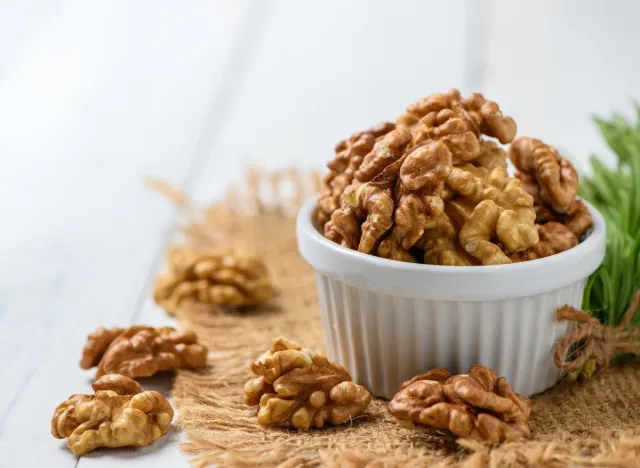
Whether you’re eating them on their own, on top of your yogurt parfait, or on top of a creamy pasta dish, walnuts are one of the healthiest nuts you can enjoy.
For starters, “Walnuts are a source of plant-based protein, fiber, and fat,” says Manaker. “[They] are the only tree nut that is a source of ALA omega-3 fatty acids,” Manaker adds, which have been found to help with heart, brain, and eye health.
“Data also shows that partially replacing meat with walnuts may [increase] the average intake of fiber, magnesium, and omega-3 fatty acids among consumers, and this partial replacement may also result in improved overall diet quality,” says Manaker.
Macadamia nuts
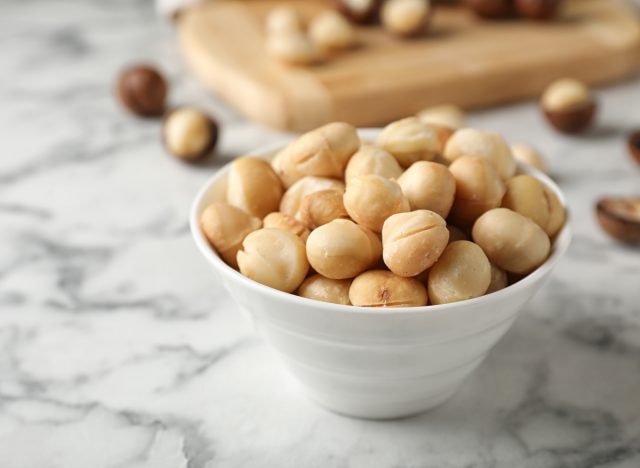
Macadamia nuts may not be as popular as other nuts like walnuts, almonds, or pistachios, but this snack offers a slightly sweet taste and according to research, it offers plenty of health benefits as well.
“Data suggests macadamia nuts can be included in a heart-healthy dietary pattern that reduces cardiovascular disease risk factors,” says Manaker, and this same data suggests that replacing high-saturated foods with nuts like macadamia nuts may also help in lowering heart disease risk.
Manaker adds “One study published in the Journal of Nutrition also showed that, among men with high cholesterol, macadamia nut consumption may support lower LDL ‘bad’ cholesterol.”
Almonds
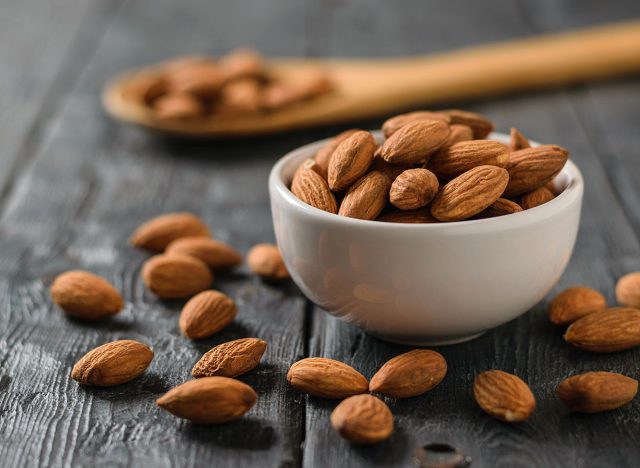
Almonds are great for snacking because they contain healthy fats, protein, and fiber to help keep you full, but this healthy nut is different from the rest in that it contains the highest levels of vitamin E—just one ounce of almonds contains 45% of your daily value.
Vitamin E has powerful antioxidant properties and is known for helping to reduce inflammation and improve immune function, and has also been linked to lowering the risk of coronary heart disease and improving both brain and eye health.
Along with providing high levels of vitamin E, research also shows that regularly eating almonds as part of a healthy diet can potentially help reduce LDL and total cholesterol.
Brazil nuts
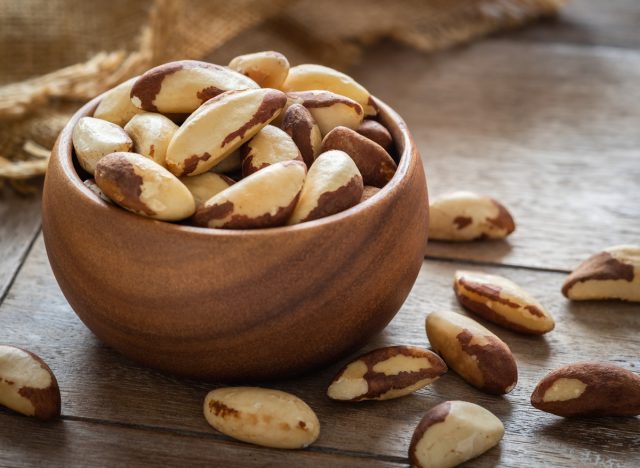
You can see by now that incorporating any type of nut into your diet can provide you with helpful vitamins and nutrients, and Brazil nuts are no exception. Along with providing a dose of protein, and fat—which makes them a satiating snack—Brazil nuts are probably best known for their extremely high levels of selenium.
In just one Brazil nut you’ll get 96 micrograms of selenium, which is already 174% of your daily value! Your body requires selenium for a number of basic functions like thyroid hormone metabolism, protection from oxidative damage, and DNA synthesis, and this nutrient has also been linked to the reduction of certain cancers, cardiovascular disease, and cognitive decline.
One important thing to note is that because Brazil nuts are so high in selenium, it is easy to take in too much of this nutrient and reach your upper limit of 400 micrograms. According to the National Institutes of Health, consistently exceeding your upper limit of selenium may lead to stomach issues, hair loss, or problems with your nervous system.
Cashews
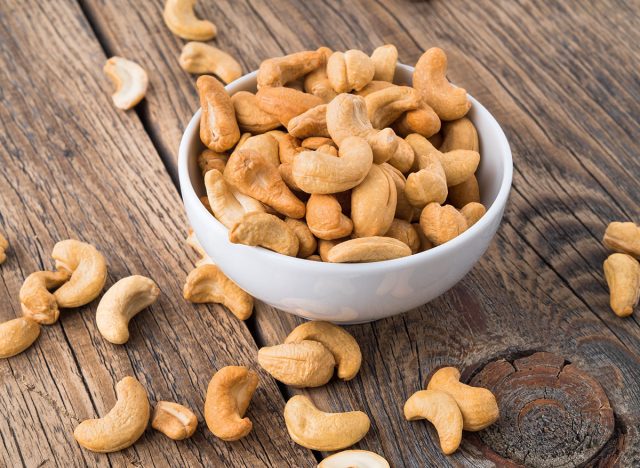
Cashews are a nut that provides a bit of a softer texture and a milder flavor than some others on the list, but they are nothing short of a super healthy snack choice.
For one, cashews are high in protein, healthy fats, and vitamins like vitamin K and magnesium, which means you can easily increase your nutrient intake with a one-ounce serving.
Beyond its basic nutrient profile, some research has found that this nut may specifically be helpful for those with type 2 diabetes. In a study published in the International Journal of Endocrinology and Metabolism, diabetes patients who consumed a daily serving of cashews saw lower insulin levels and reduced cholesterol.
A 2019 review from Current Developments in Nutrition also found that regular consumption of cashews may be able to help lower blood pressure, but the research is still inconclusive on the overall effects on various heart health factors.
Pecans
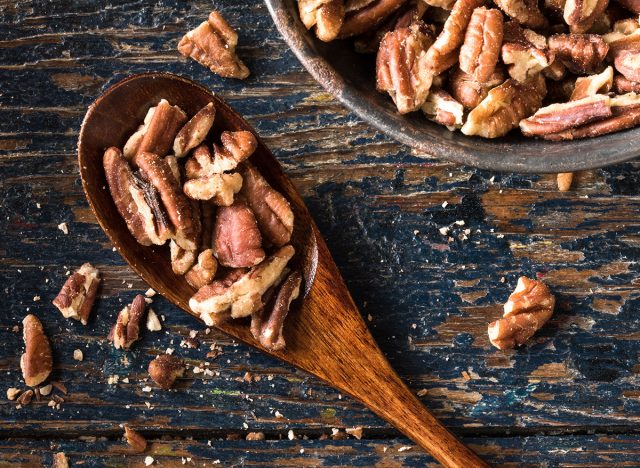
You may know them best as the main component of a delicious slice of pecan pie, but pecans at their base are healthy nuts that provide your body with a handful of nutrients and health benefits.
Pecans are a bit lower in protein and fiber than many of the other nuts on our list, but they make up for it in healthy fats and levels of vitamin B, zinc, and manganese. This nut has also been linked to improving heart health factors and insulin levels.
According to a 2020 study published in the Journal of Human Nutrition and Dietetics, participants with coronary heart disease saw an improvement in their cholesterol levels after eating a daily dose of pecans for three months.
A 2018 study published in the journal Nutrients found that patients with obesity who consumed a “pecan-rich diet” saw an improvement in their insulin, which the researchers say is an important factor in cardiometabolic health (AKA the health of your heart, blood, and blood vessels).
Hazelnuts
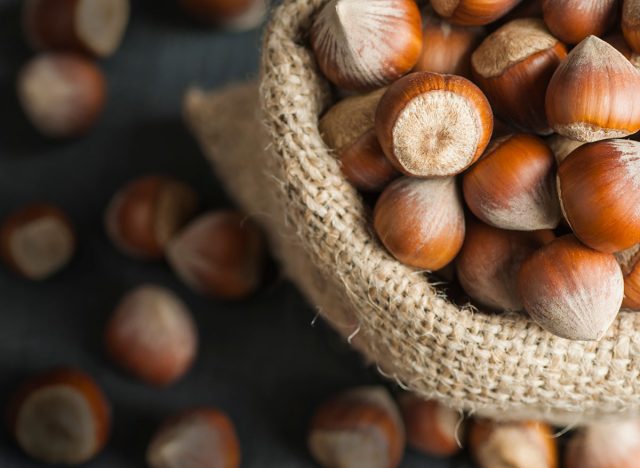
Last but certainly not least, hazelnuts make our list of healthiest nuts for a variety of reasons. Sure, this nut may be best appreciated for its role in Nutella, but at its core, this nut can offer a significant portion of your daily value for things like vitamin E, manganese, and magnesium, and it can help you increase your intake of healthy fats, protein, and fiber.
On top of that, hazelnuts have also been found to contain a high level of antioxidant plant compounds that have been linked to lower levels of inflammation and oxidative stress damage.
Some research has also found that hazelnuts may be able to help improve heart health as well. For instance, a study from the Journal of Clinical Lipidology found that hazelnuts may be able to reduce levels of LDL and total cholesterol in those with existing high cholesterol.
- Source: Nuts and Cardiovascular Disease Outcomes: A Review of the Evidence and Future Directions
- Source: Beneficial Effects of Walnuts on Cognition and Brain Health
- Source: Effect of Nuts on Markers of Inflammation and Oxidative Stress: A Narrative Review
- Source: Composition of Nuts and Their Potential Health Benefits—An Overview
- Source: Quantification of Phytochemicals, Cellular Antioxidant Activities and Antiproliferative Activities of Raw and Roasted American Pistachios
- Source: Beneficial effect of pistachio consumption on glucose metabolism, insulin resistance, inflammation, and related metabolic risk markers
- Source: USDA FoodData Central; walnuts
- Source: Cleveland Clinic-Omega-3 Fatty Acids
- Source: A Dietary Model of Partial Meat Replacement with Walnuts Demonstrates Changes in the Nutrient Profile and Quality of the United States Population’s Diet
- Source: A macadamia nut-rich diet reduces total and LDL-cholesterol in mildly hypercholesterolemic men and women
- Source: Macadamia nut consumption lowers plasma total and LDL cholesterol levels in hypercholesterolemic men
- Source: USDA FoodData Central; almonds
- Source: National Institutes of Health; Vitamin E
- Source: Effect of Almond Consumption on Metabolic Risk Factors—Glucose Metabolism, Hyperinsulinemia, Selected Markers of Inflammation
- Source: USDA FoodData Central; Brazil nuts
- Source: National Institutes of Health; Selenium Fact Sheet
- Source: National Institutes of Health; selenium
- Source: USDA FoodData Central; cashews
- Source: Effects of Daily Consumption of Cashews on Oxidative Stress and Atherogenic Indices in Patients with Type 2 Diabetes: A Randomized, Controlled-Feeding Trial
- Source: The Effect of Cashew Nut on Cardiovascular Risk Factors and Blood Pressure: A Systematic Review and Meta-analysis
- Source: USDA FoodData Central; pecans
- Source: Effects of a healthy diet enriched or not with pecan nuts or extra-virgin olive oil on the lipid profile of patients with stable coronary artery disease
- Source: A Pecan-Rich Diet Improves Cardiometabolic Risk Factors in Overweight and Obese Adults: A Randomized Controlled Trial
- Source: USDA FoodData Central; hazelnuts
- Source: A Hazelnut-Enriched Diet Modulates Oxidative Stress and Inflammation Gene Expression without Weight Gain
- Source: Hazelnut-enriched diet improves cardiovascular risk biomarkers beyond a lipid-lowering effect in hypercholesterolemic subjects









